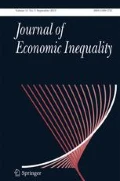Abstract
There is a rich literature on the importance of historical agriculture as long-term shaper of culture, institutions, and economic development. How much this changes over time, however, we understand much less. In Kenya, we compare the educational attainment between individuals with nomadic and non-nomadic ancestors over time and find a large and quite persistent gap in all periods that we examine (2006, 2009, 2013, 2016) as well as in different age cohorts. We find an especially large gap for individuals with nomadic ancestors who live in rural areas and who are women. In urban areas, we also do find evidence for some, recent improvement, but only when we restrict the comparison group to individuals from other non-English and non-Swahili speaking ethnicities.
Similar content being viewed by others
References
Alesina, A., Giuliano, P.: Culture and institutions. J. Econ. Lit. 53(4), 898–944 (2015)
Alesina, A., Hohmann, S., Michalopoulos, S., Papaioannou, E.: Intergenerational Mobility in Africa. Research, National Bureau of Economic (2019)
Austin, G.: The ‘reversal of fortune’thesis and the compression of history: perspectives from African and comparative economic history. J Int Dev: J Dev Stud Assoc. 20(8), 996–1027 (2008)
Birch, I. (2010). Towards Education for Nomads: Community Perspectives in Kenya, IIED
Boit, J.M.: Who benefits from secondary education bursary Fund in Kenya? Int. J. Educ. 7(2), 337–349 (2015)
Cameron, A. C. and P. K. Trivedi (2005). Microeconometrics: methods and applications, Cambridge University Press
Carr-Hill, R. and E. Peart (2005). "The education of nomadic peoples in East Africa: Review of relevant literature."
Chanda, A., Cook, C.J., Putterman, L.: Persistence of fortune: accounting for population movements, there was no post-Columbian reversal. Am. Econ. J. Macroecon. 6(3), 1–28 (2014)
FSD Kenya. (2007). "financial access in Kenya - results of the 2006 National Survey." from https://s3-eu-central-1.amazonaws.com/fsd-circle/wp-content/uploads/2015/08/30095840/FinaccessReportFINALMain.pdf
FSD Kenya. (2016). "FinAccess National Survey: dynamics of Kenya's changing financial landscape." from http://fsdkenya.org/
Galor, O., Özak, Ö.: The agricultural origins of time preference. Am. Econ. Rev. 106(10), 3064–3103 (2016)
Grosjean, P.: A history of violence: the culture of honor and homicide in the US south. J. Eur. Econ. Assoc. 12(5), 1285–1316 (2014)
Kagotho, N.: Targeting the reach of educational support interventions in Kenya. Child Youth Serv. Rev. 61, 211–215 (2016)
Krätli, S. (2001). "Education Provision to Nomadic Pastoralists: a Literature Review."
Michalopoulos, S. and E. Papaioannou (2019). "Historical Legacies and African Development." Journal of Economic Literature forthcoming
Michalopoulos, S., Putterman, L., Weil, D.N.: The influence of ancestral lifeways on individual economic outcomes in sub-Saharan Africa. J. Eur. Econ. Assoc. 17(4), 1186–1231 (2018)
Mugo, J.K., Nderitu, J.K., Ruto, S.J.: The 2015 promise of education for all in Kenya: missed target or new start? ZEP: Zeitschrift für Internationale Bildungsforschung und Entwicklungspädagogik. 38(2), 16 (2015)
Murdock, G.P.: Africa: its Peoples and their Culture History. McGraw-Hill, New York (1959)
Murdock, G.P.: Ethnographic Atlas. University of Pittsburgh Press, Pittsburgh (1967)
Nunn, N.: The importance of history for economic development. Annu. Rev. Econ. 1(1), 65–92 (2009)
Nunn, N.: Historical development. Handbook of Economic Growth, Elsevier. 2, 347–402 (2014)
Nunn, N.: The historical roots of economic development. Science. 367(6485), eaaz9986 (2020)
Ogola, F. O. (2010). "Free Education in Kenya’s Public Primary Schools." Addressing the Challenges. Organization for Social Science Research in Eastern and Southern Africa (OSSREA). Addis Ababa, Ethiopia
Okilwa, N.S.: Educational marginalization: examining challenges and possibilities for improving educational outcomes in northeastern Kenya. Global Education Review. 2(4), 5–18 (2015)
Olsson, O., Hibbs Jr., D.A.: Biogeography and long-run economic development. Eur. Econ. Rev. 49(4), 909–938 (2005)
Pinkovskiy, M., Sala-i-Martin, X.: Africa is on time. J. Econ. Growth. 19(3), 311–338 (2014)
Putterman, L.: Agriculture, diffusion and development: ripple effects of the neolithic revolution. Economica. 75(300), 729–748 (2008)
Ross, P. H. (2018). "Ancestral Roots of Locus of Control." Job Market Paper
Wuepper, D., Drosten, B.: Historical Roots and Economic Implications of Self-Efficacy. Working Paper, TU Munich (2017)
Wuepper, D., H. Lang and E. Benjamin (2020). Dataset to "Ancestral Ways of Life and Human Capital Formation in Kenya". ETH Research Collection
Wuepper, D., Lybbert, T.J.: Perceived self-efficacy, poverty, and economic development. Ann. Rev. Resour. Econ. 9, 383–404 (2017)
Wuepper, D., Sauer, J.: Moving forward in rural Ghana: investing in social and human capital mitigates historical constraints. Econ History Dev Regions. 32(2), 177–209 (2017)
Wuepper, D., Zilberman, D., Sauer, J.: Non-cognitive skills and climate change adaptation: empirical evidence from Ghana’s pineapple farmers. Clim. Dev. 1–12 (2019)
Author information
Authors and Affiliations
Corresponding author
Additional information
Publisher’s Note
Springer Nature remains neutral with regard to jurisdictional claims in published maps and institutional affiliations.
Electronic supplementary material
ESM 1
(PDF 103 kb)
Rights and permissions
About this article
Cite this article
Wuepper, D., Lang, H. & Benjamin, E. Ancestral Ways of Life and Human Capital Formation in Kenya. J Econ Inequal 18, 571–584 (2020). https://doi.org/10.1007/s10888-020-09450-x
Received:
Accepted:
Published:
Issue Date:
DOI: https://doi.org/10.1007/s10888-020-09450-x




